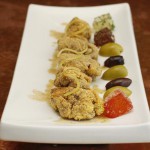- Roe, Adam roe: Chef Adam Bannasch of Zambra panfries rockfish roe. Photos by Jonathan Welch
- Go fish: Rockfish milt looks very similar to rockfish roe — that is, it can be harvested from the fish in a sack, of sorts.
Bizarre Foods with Xpress
In the debut of this series, Xpress whetted your appetite for the stranger side of dining with talk of "secondary" cuts of meat like kidneys and heart. This week, we're digging a little deeper to talk fish parts (and oysters that have nothing to do with the ocean) with chef Adam Bannasch of Zambra tapas restaurant in downtown Asheville.
While liver and tongue are familiar enough dishes that many more open-minded diners can eventually warm to, what about fish sperm and roe sacks? Crickets and ants? They're all eaten elsewhere in the world. While insects are an important part of the diet in places like Mexico and Africa, here in the states such things are considered taboo.
And that discrimination against certain foodstuffs in our somewhat puritan culinary culture is just as pronounced when it comes to reproductive organs. Rocky Mountain “oysters” (a more acceptable name for cow testicles) are practically considered the stuff of rural legend — the deep south’s very own bizarre food.
Pushing the culinary envelope
Bannasch enjoys toying with such interesting offerings as lamb “oysters” and the duck gizzards that he confits. It keeps things fresh and exciting for both the customers and the cooks alike, he says. While offal — a catch-all term for underutilized parts and pieces of the animal — has turned up on Bannasch's ever-changing innovative menu for years now, the chef continues to expand his horizons. "I'm willing to try to cook anything," he says.
With offal becoming ever more standard, Xpress couldn’t help but ask whether Bannasch would ever consider serving bugs for the sake of pushing the envelope, what with all of the other interesting fare he’s sending out of the kitchen. If it tastes good, he says, why not?
In fact, Zambra sous chef Gary Sernack is preparing to guest-chef for a wild-foods dinner series, hosted by local foraged foods expert Alan Muskat, called "No Taste Like Home." Among other things, Sernack is preparing “ants on a log” — using real ants.
For now, says Bannasch, Zambra's menu focuses on comparatively tamer fare, for the most part. A recent multi-course tasting of "strange" foods, whipped up by the kitchen staff for the purposes of our research, included a blackened duck-heart taco with a beet creme frâiche, pineapple and slaw.
While the tiny duck hearts were surprisingly tame in flavor, the same could not be said for Bannasch’s offering of a butter-fried rockfish-roe sack served over garlicky gnocchetti, guanciale and Brussels sprouts. While some at the table fawned over the deep-ocean flavor of the dish, some simply couldn't get over the veiny appearance of the roe sack and its unique texture. The flavor of a rockfish-roe sack is both earth and sea at once, and likely an acquired taste — most certainly the texture takes some getting used to as well; think fish-egg sausage. There's probably a reason why many fisherman use it as bait.
How to speak about fish, er …
Lamb oysters, breaded and fried, stick to the old cliché that, when it comes down to it, many things just taste like chicken. The flavor profile isn’t all that difficult for the servers to explain to curious customers. However, in talks with the staff, Xpress discovered that particular menu items often require delicate wording on the server’s part, especially when some diners don’t quite understand that a lamb oyster isn’t served on the half shell.
"The staff's been in some precarious situations," says Bannasch, who's currently trying to figure out how to coach the servers to speak about fish sperm — and more about that later.
There was one occasion, says the chef, when a man accompanied by his 9-year-old daughter ordered the lamb oysters. "The server could tell that the man thought that they were, you know, oyster oysters by the way that he ordered them." Trying to politely set the man straight without providing an inadvertent anatomy lesson for the child was an interesting experience, to be sure (and involved a little gesturing out of the kid’s sight-line, says Bannasch).
The envelope, please …
The award for causing the Most Awkward Server-Guest Relations must go to the rockfish "milt," aka rockfish sperm sack. The stuff absolutely needs a prettier name, because the admittedly nasty-sounding fare deserves to be awarded a much higher position on the list of ocean delicacies.
First on some minds, of course, must be how fish sperm is harvested and how it's cooked. Rockfish milt looks very similar to rockfish roe — that is, it can be harvested from the fish in a sack, of sorts. It looks very much like an organ. Our apologies if we lost or sickened a few readers on that last part.
And the texture? We'll let the chef field that one: "Pig brain is what I can compare it to most," says Bannasch. "That really soft consistency. It's really creamy, if you will. It's something else, that's for sure."
If you've managed to read this far, you may be wondering how the milt tastes. Believe it or not, it's delicious. "If the milt didn't taste good, I probably wouldn't mess with it any more," says Bannasch, who ordered the product by request of some of his customers who happen to work in the seafood distribution business. When seafood industry insiders are requesting fish sperm, it might be time to take notice. The rockfish milt, in fact, turned out to be so delicious that Bannasch has decided to stock the stuff more often. "The fact that it kind of surprises everybody with how good it is attracted me to it. It's something new for people to try."
Battering the sperm sack
To cook the milt, Bannasch slices the sack into pieces about the size of a silver dollar, lightly batters it in cornflower and pan-fries it in butter. When he served it to our table, it was accompanied with cubes of lemon gelée, each one tossed in different flavors, including coconut thyme, za'atar (a middle Eastern spice) and smoked paprika. The offering was then finished with a brown-butter vinaigrette and olives. The caramelized flavor of the brown butter was a perfect complement to the the milt, best described as tasting something like a mild ocean flan.
"Flavor-wise it's pretty subtle," says Bannasch. "It tastes like you were in the ocean hours ago, and then you lick your lips. It's a little oceany, but it never tastes like fish. And, texture-wise, it's the creamiest thing I've ever had."
And how to sell such a thing to a general audience? It's definitely a little tricky, as I found while trying to write this article. Bannasch doesn't seem to have an answer, either. "I have more coming in and I just do not know how to word it," he says. "The Japanese have some words for it, but I'm not putting Japanese words on our menu."
Should you try it if you have the chance? Absolutely, if you can quiet your mind and be brave about it, much like any other strange ocean product — like uni, for example.
And Bannasch seems to agree with the Zen approach to eating strange foods.
"I guess thinking outside the box is helpful," he says. He also points out that the movement toward eating animals in their entirety is beneficial from both an economical and waste standpoint. The rockfish roe and sperm sacks, for example, can make up a rather surprising portion of the fish’s weight. If it's edible and delicious enough, why toss it out? Bannasch agrees. "I hope that this isn't a passing trend because I really like to do it," he says. "It goes along with the sustainable movement as it gains steam. You're eating the whole animal. I think that people are attracted to that part — connecting with their food a little more."
Bannasch also says that it's nice to be able to offer people something that they aren't going to be able to get anywhere else. "It's kind of a leap of faith, but if people want to walk away with a unique experience, this is probably a good start."
— Send your food news to Mackensy Lunsford at food@mountainx.com.





Before you comment
The comments section is here to provide a platform for civil dialogue on the issues we face together as a local community. Xpress is committed to offering this platform for all voices, but when the tone of the discussion gets nasty or strays off topic, we believe many people choose not to participate. Xpress editors are determined to moderate comments to ensure a constructive interchange is maintained. All comments judged not to be in keeping with the spirit of civil discourse will be removed and repeat violators will be banned. See here for our terms of service. Thank you for being part of this effort to promote respectful discussion.